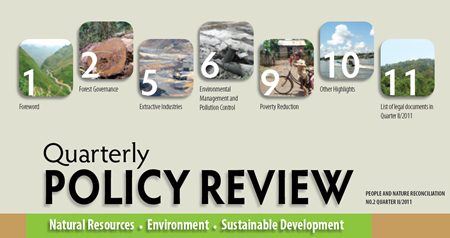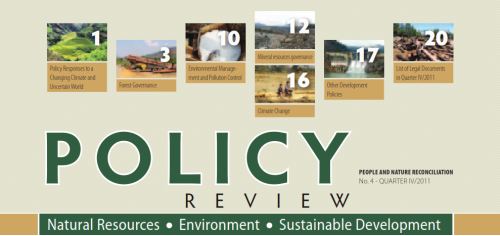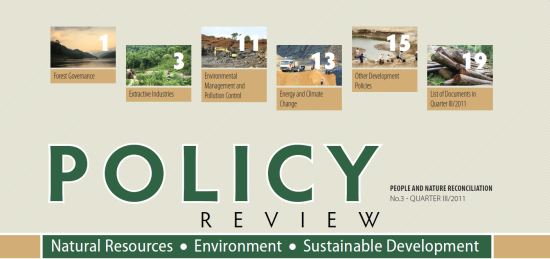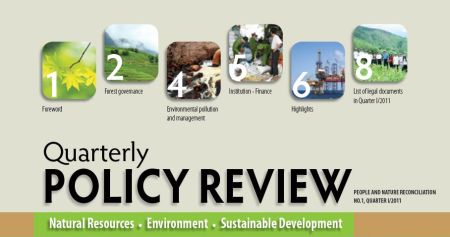During the last quarter of 2011, many important events and policies related to environmental protection, climate change, and efficient use of natural resources were discussed and decided. At the global level, one of the most significant events is the 17th United Nations Climate Change Conference (COP-17), which was taking place from November 28th to December 11th, 2011 in Durban, South Africa. Meanwhile, in Vietnam, the Government has promulgated important strategies for combating climate change and governing mineral resources.

Policy Review – Quarter II/2011

During the second quarter of 2011, 51 legal documents related to natural resources and environment sector were either promulgated or put into effect. Most of these documents focus on environmental management and pollution control. Noticeably, the Decree No.29/2011/ND-CP was promulgated on the 18th of April, 2011 providing strategic environment assessment, environmental impact assessment and commitment to environment protection.
The Decree No.29/2011/ND-CP came into effect on June 5th 2011, and replaces various articles related to strategic environment assessment (SEA), environmental impact assessment (EIA) and commitment to environment protection in Decree No.80/2006/ND-CP and Decree No.21/2008/ND-CP. Overall, this decree is one of the efforts made by the government to tighten regulations on environmental impact assessment for development projects.
The new decree has changed the minimum scale and size of various projects on the list subject to the implementation of EIA. Some typical examples include hydropower projects with a reservoir capacity over 100,000 m3 (while the old regulation required a minimum capacity of over 300,000 m3), solid mineral mining projects with a capacity over 50,000 m3 per year (while the old regulation was over 100,000 m3 per year), and all cement product projects (the previous regulation required a minimum of 300,000 tons per year).
In addition, there are changes in the appraisal and approval process of EIA reports. According to the old regulations, the responsibilities of appraisal and approval of EIA reports were only given to the Ministry of Natural Resources and Environment (MONRE) or the Provincial People’s Committees. However, in the new legislation, depending on each specific project, these responsibilities will be delegated to other ministries. For examples, the Ministry of Defense and the Ministry of Public Security will appraise all projects related to security and defense while MONRE has the authority to appraise 11 other types of projects, including oil refining, land reclamation, hazardous waste and nuclear electricity projects.
While the Decree No.29/2011/ND-CP has provided strict adjustments made in the implementation of environmental impact assessment, corporate responsibilities and community consultation in the project development process, it still remains flawed. In particular, the entrustment of other ministries, ministerial and governmental agencies with the authority to appraise EIA reports of their own projects will make it difficult to ensure the objectiveness of the appraisal process. (For more details, please see page 6 of this Policy Review).



